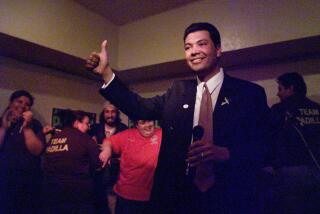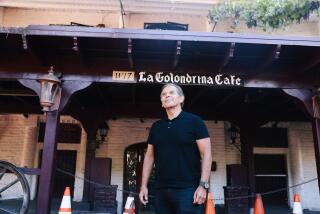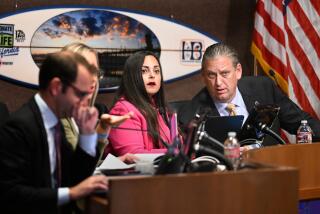Session to Heal Racial Tensions Seen as a Positive Step Despite No-Shows
- Share via
In the hopes of healing racial wounds that threatened to divide the city nearly a year ago, Carson elected officials and community leaders gathered Saturday, but lingering tension among City Council members may have impeded the dialogue.
Missing were some of the city’s most important leaders embroiled in the controversy: two City Council members and a former mayor.
“I see this division between our City Council. I would like our City Council to be more united,” said Sybil Brown of the Senior Citizens Advisory Commission. “This was very important for everybody. It was an excellent beginning.”
Last July, public outcry grew over the hiring practices of former Mayor Pete Fajardo, a Filipino American. Critics said the mayor of one of the region’s most racially balanced cities was favoring supporters of his own ethnicity by awarding them city contracts and jobs.
At the same time, City Manager Jerry Groomes, who is African American, was criticized by some Filipinos for not hiring more Filipinos for City Hall positions. Racial tensions reached a breaking point after Fajardo tried to strip the city manager of his hiring power.
Before subsiding, the controversy left the City Council divided along racial lines. With two Filipinos, two blacks and a white member, Carson’s council reflected its community.
The 2000 census showed that blacks and Asians each make up about a quarter of the South Bay city’s population, which is 89,730. Latinos and whites each make up between 11% and 13%.
When he took office in March, newly elected African American Mayor Daryl W. Sweeney promised to usher in a new era of open communication and to make his top priority the city’s reunification.
Standing alone, beside a banner with “Unity starts with you” splashed across it in bold letters, Sweeney reminded those who attended the breakfast discussion that “there is no magic formula that will instantly bring reunification.”
“It’s really up to us to learn how to listen to each other,” he said. “Unity starts with you. Take what you learn back to your communities.”
Seven tables filled with former mayors, City Council members, women’s groups and leaders from the city’s various ethnic communities came up with ideas on how they could start healing the city. Some proposed starting diversity education in kindergarten, creating a “unity” vision statement, and even having a regular cable TV show where dialogues about race could be broadcast to the entire community.
Still, some said the absence of two council members who had been scheduled to make 10-minute opening statements made it obvious that the City Council did not uniformly support the effort.
“They’re not embracing the community overall,” said Rick Pulido, administrator of the Carson Retirement Center, shaking his head. “Mayor Sweeney has extended an olive branch and they should be here at the table. They shouldn’t be acting like children.”
Council members Kay Calas and Manny Ontal, the council’s only Filipino member, did not attend. And despite indications that former Mayor Fajardo would join in, he was not there. During last year’s controversy, Sweeney and Frank defended the city manager against Calas, Ontal and Fajardo.
Calas, Ontal and the former mayor could not be reached for comment.
Newest council member Jim Dear (who replaced Fajardo) said he thought their absence was in part the fault of the current mayor.
It was “inappropriate,” he said, that other council members were never asked to vote on the event nor asked if they would like to get involved. Dear said he felt so removed from the event that he didn’t even know he was scheduled to make an opening statement.
“If I slap you in the face and a week later say let’s be friends . . . doesn’t something else have to come first?” he said. “Before this event I would’ve like to have seen five council members sit down and discuss this, but I understand everyone’s busy.”
Mayor Sweeney responded: “I don’t think it’s necessary because it’s my vision. I’m one of those people that doesn’t believe you do everything through meetings. I’m from corporate America. . . . You don’t need a meeting to plan a meeting.”
Despite the absences, many said they thought that the day was a very productive beginning. A second such meeting will take place June 23.
“It’s not about race,” said Fernando Argosino of the Asian American Drug Abuse Program. “We’re all racist on a certain level, but we can come here under the camaraderie of representing Carson . . . this is the beginning of a process.”
More to Read
Get the L.A. Times Politics newsletter
Deeply reported insights into legislation, politics and policy from Sacramento, Washington and beyond. In your inbox twice per week.
You may occasionally receive promotional content from the Los Angeles Times.










